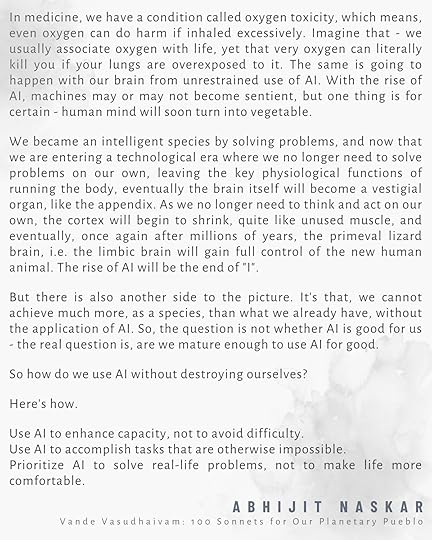Abhijit Naskar's Blog - Posts Tagged "consciousness-mind-brain"
Brain makes the mind, mind makes the person.
Half knowledge is more dangerous than ignorance. Take the notion that jellyfish don’t have a brain, for example. When we talk about the brain, we’re actually referring to the central nervous system. In case of the jellyfish, the nervous system is not centralized, instead it’s spread across the anatomy. So the actual fact is, jellyfish do have a brain, it just doesn’t look like one. Even trees have a brain, a nervous system that is. To put it simply, consciousness is the supreme fundamental of life, and it is impossible to have consciousness without having some sort of nervous system, for consciousness is the creation of the nervous system.
Published on August 09, 2022 09:21
•
Tags:
consciousness-mind-brain, consciousness-quotes, human-brain, ignorance, midfulness, mind-body-spirit, neurobiology, neurology, neuroscience, pseudoscience, psychiatry, psychology
Evolution & Electronics (The Sonnet) | Corazon Calamidad
I know electronic circuitry like the back of my hand,
Yet it’s the human mind that fascinates me most immensely.
Fascination in electronics lies in new design possibility,
Whereas the mind is the breeding ground of all possibility.
Our engineering is puny compared to that of Mother Nature,
Each day a new mystery unfolds in the vast organic kingdom.
Our puny electronics work based on cold ‘n rigid computation,
Evolution of life in nature is predicated on plastic mutation.
That’s why we must never disregard nature blinded by arrogance,
We may have conquered nature’s mercy but we’re still subordinate.
The moment a lifeform starts to vilify the womb whence it came,
With a single blow creator nature can flatten all our obstinance.
Foster humility and wisdom, before going nuts about technology.
Don’t end up yet another fancy stain upon the honor of humanity.
Yet it’s the human mind that fascinates me most immensely.
Fascination in electronics lies in new design possibility,
Whereas the mind is the breeding ground of all possibility.
Our engineering is puny compared to that of Mother Nature,
Each day a new mystery unfolds in the vast organic kingdom.
Our puny electronics work based on cold ‘n rigid computation,
Evolution of life in nature is predicated on plastic mutation.
That’s why we must never disregard nature blinded by arrogance,
We may have conquered nature’s mercy but we’re still subordinate.
The moment a lifeform starts to vilify the womb whence it came,
With a single blow creator nature can flatten all our obstinance.
Foster humility and wisdom, before going nuts about technology.
Don’t end up yet another fancy stain upon the honor of humanity.
Published on October 23, 2022 11:27
•
Tags:
biologist-poem, climate-crisis, consciousness-mind-brain, engineering-poetry, evolutionary-biology, evolutionary-psychology, fourth-industrial-revolution, machine-learning, neurology
What is Afterlife (The Sonnet) | Sin Dios Sí Hay Divinidad
“The building blocks of life come from nature, and upon death they merge back with nature. Afterlife is about living in people’s heart, not in some fictitious paradise. Do something so impossibly human that the humans aren’t able to forget you ever.”
“What is Afterlife (The Sonnet)
Read a few books, you live a little.
Help a few beings, you live a lifetime.
Heaven is not a place high above the sky,
Heaven is the moment you’re someone’s lifeline.
Even I enjoy a good dc and marvel story,
But it mustn’t turn you blind to reality.
To live selfish is the animal’s purgatory,
To die while living for others is humanity.
Memory is the fabric upon which time is carved.
Where there is no memory, there is no time.
Neurons are the building blocks of mind and memory.
Where there is no neuron, there is no paradise.
There’s not one but two paradise, one real, another fiction.
The real one is made of action, the other imagination.”
“What is Afterlife (The Sonnet)
Read a few books, you live a little.
Help a few beings, you live a lifetime.
Heaven is not a place high above the sky,
Heaven is the moment you’re someone’s lifeline.
Even I enjoy a good dc and marvel story,
But it mustn’t turn you blind to reality.
To live selfish is the animal’s purgatory,
To die while living for others is humanity.
Memory is the fabric upon which time is carved.
Where there is no memory, there is no time.
Neurons are the building blocks of mind and memory.
Where there is no neuron, there is no paradise.
There’s not one but two paradise, one real, another fiction.
The real one is made of action, the other imagination.”
Published on January 01, 2023 14:39
•
Tags:
afterlife, brainy-quotes, consciousness-mind-brain, heaven-and-hell, helping-others, holiness, humanist-poetry, kingdom-of-god, naturalism, neurotheology, psychology-of-religion, what-happens-when-we-die
AI – The Whole Picture | Vande Vasudhaivam
In medicine, we have a condition called oxygen toxicity, which means, even oxygen can do harm if inhaled excessively. Imagine that – we usually associate oxygen with life, yet that very oxygen can literally kill you if your lungs are overexposed to it. The same is going to happen with our brain from unrestrained use of AI. With the rise of AI, machines may or may not become sentient, but one thing is for certain – human mind will soon turn into vegetable.
We became an intelligent species by solving problems, and now that we are entering a technological era where we no longer need to solve problems on our own, leaving the key physiological functions of running the body, eventually the brain itself will become a vestigial organ, like the appendix. As we no longer need to think and act on our own, the cortex will begin to shrink, quite like unused muscle, and eventually, once again after millions of years, the primeval lizard brain, i.e. the limbic brain will gain full control of the new human animal. The rise of AI will be the end of “I”.
But there is also another side to the picture. It’s that, we cannot achieve much more, as a species, than what we already have, without the application of AI. So, the question is not whether AI is good for us – the real question is, are we mature enough to use AI for good.
So how do we use AI without destroying ourselves?
Here’s how.
Use AI to enhance capacity, not to avoid difficulty.
Use AI to accomplish tasks that are otherwise impossible.
Prioritize AI to solve real-life problems, not to make life more comfortable.

We became an intelligent species by solving problems, and now that we are entering a technological era where we no longer need to solve problems on our own, leaving the key physiological functions of running the body, eventually the brain itself will become a vestigial organ, like the appendix. As we no longer need to think and act on our own, the cortex will begin to shrink, quite like unused muscle, and eventually, once again after millions of years, the primeval lizard brain, i.e. the limbic brain will gain full control of the new human animal. The rise of AI will be the end of “I”.
But there is also another side to the picture. It’s that, we cannot achieve much more, as a species, than what we already have, without the application of AI. So, the question is not whether AI is good for us – the real question is, are we mature enough to use AI for good.
So how do we use AI without destroying ourselves?
Here’s how.
Use AI to enhance capacity, not to avoid difficulty.
Use AI to accomplish tasks that are otherwise impossible.
Prioritize AI to solve real-life problems, not to make life more comfortable.

Published on May 04, 2023 15:56
•
Tags:
ai, algorithm, algorithms, artificial-intelligence, chatgpt, consciousness-mind-brain, evolution, evolutionary-biology, evolutionary-psychology, human-evolution, innovation, intelligent-species, machine-learning, natural-selection, neurobiology, neuropsychology, neuroscience, progress, robotics, smart-devices, social-development, technological-advancement, technology, transhumanism
100 Questions of Life | Abhijit Naskar | Rowdy Scientist
6. What is perfection?
Perfection is imperfections we’ve made peace with.
…
13. What is nature?
Nature is order within chaos.
14. What is order?
Order is but friendship with chaos.
15. What is chaos?
Chaos is order we are yet to understand.
…
21. What is knowledge?
Knowledge is ignorance we’ve chosen to correct.
22. What is choice?
Choice is the fulcrum of freedom.
23. What is freedom?
Freedom is the fulcrum of responsibility.
24. What is responsibility?
Responsibility is the act of backbone.
25. What is backbone?
Backbone is more than a stick to hang your head.
26. What is the head?
Head is the mightiest carrier of progress.
27. What is progress?
Progress is much more than mere functioning of nuts
and bolts.
28. What are nuts and bolts?
Nuts and bolts are our greatest defense against
unforeseen terrors of nature, on earth and beyond.
…
53. What is heritage?
Heritage, in moderation, is an aid to growth,
unmoderated, poison.
…
57. What is death?
Death is but the fear of life.
58. What is fear?
Fear is but memory of our animal past.
59. What is memory?
Memory is the fabric of time.
60. What is time?
Time is the meaning behind moments.
…
78. What is curiosity?
Curiosity is a challenge to superstition.
79. What is superstition?
Superstition is nature’s antidote to the insecurity of
the unknown.
80. What is insecurity?
Insecurity is wisdom of the jungle against possible
predatory attack.
81. What is wisdom?
Wisdom is the result of travel in mind, not in time or
space.
Perfection is imperfections we’ve made peace with.
…
13. What is nature?
Nature is order within chaos.
14. What is order?
Order is but friendship with chaos.
15. What is chaos?
Chaos is order we are yet to understand.
…
21. What is knowledge?
Knowledge is ignorance we’ve chosen to correct.
22. What is choice?
Choice is the fulcrum of freedom.
23. What is freedom?
Freedom is the fulcrum of responsibility.
24. What is responsibility?
Responsibility is the act of backbone.
25. What is backbone?
Backbone is more than a stick to hang your head.
26. What is the head?
Head is the mightiest carrier of progress.
27. What is progress?
Progress is much more than mere functioning of nuts
and bolts.
28. What are nuts and bolts?
Nuts and bolts are our greatest defense against
unforeseen terrors of nature, on earth and beyond.
…
53. What is heritage?
Heritage, in moderation, is an aid to growth,
unmoderated, poison.
…
57. What is death?
Death is but the fear of life.
58. What is fear?
Fear is but memory of our animal past.
59. What is memory?
Memory is the fabric of time.
60. What is time?
Time is the meaning behind moments.
…
78. What is curiosity?
Curiosity is a challenge to superstition.
79. What is superstition?
Superstition is nature’s antidote to the insecurity of
the unknown.
80. What is insecurity?
Insecurity is wisdom of the jungle against possible
predatory attack.
81. What is wisdom?
Wisdom is the result of travel in mind, not in time or
space.
Published on July 26, 2023 05:13
•
Tags:
accomplishment, achievement, ambition, ambitious, backbone, brain, brainy-quotes, consciousness, consciousness-mind-brain, courage, courageous, curiosity, dignity, educate, educated, education, existentialism, freedom, guts, honor, honorable, ignorance, ignorant, insecurity, knowledge, learning, life-goals, life-lessons, memory, mental-health-awareness, mind, neurology, neuroscience, progress, psychology, pursuit-of-knowledge, self-esteem, self-respect



